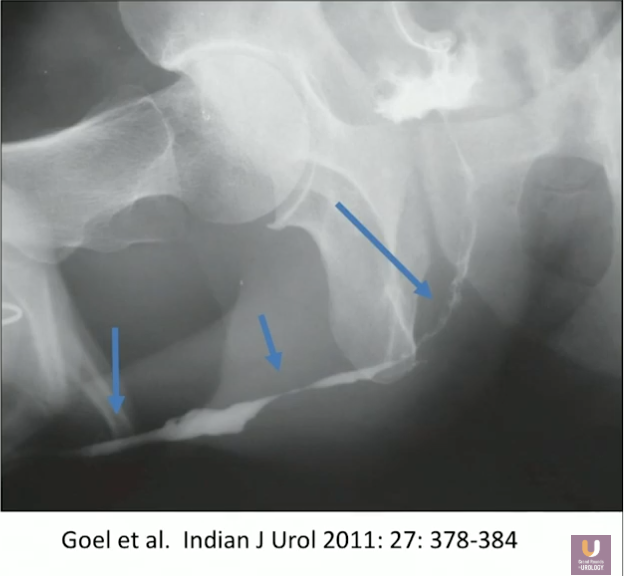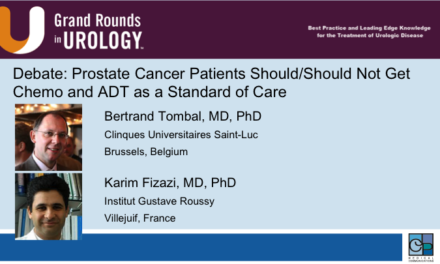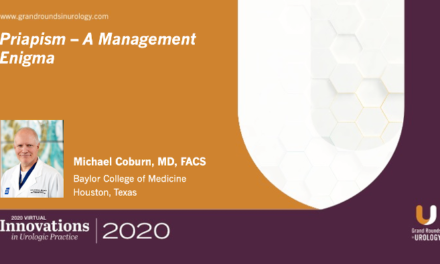Michael Coburn, MD, FACS, presented “Urethral Strictures Guidelines Update” during the 23rd Annual Innovations in Urologic Practice on September 14, 2018 in Santa Fe, New Mexico.
How to cite: Coburn, Michael. “Urethral Strictures Guidelines Update” September 14, 2018. Accessed [date today]. https://grandroundsinurology.com/urethral-strictures-guidelines-update/
Urethral Strictures Guidelines Update – Summary:
Michael Coburn, MD, FACS, highlights key points from the 2016 American Urological Association (AUA) male urethral stricture guidelines. He also brings attention to certain controversial statements and evidence-based treatment approaches in special circumstances.
Abstract:
The 2016 AUA male urethral stricture guidelines derived evidence from a systematic review of related literature published during 1990-2015. Unfortunately, there are virtually no randomized prospective management studies pertaining to urethral strictures. The majority of the guidelines are based on level “C” evidence, in other words small case series, expert opinion, and clinical principles. This may pose a challenge when making evidence-based treatment decisions.
This presentation highlights the key points of the 2016 AUA guidelines, such as diagnosis and initial management, dilation and internal urethrotomy, urethroplasty, anterior urethral reconstruction, pelvic fracture urethral injury, delayed posterior urethroplasty, bladder neck contracture, vesicourethral stenosis, and postoperative follow-up.
Specifically, this presentation will draw attention to controversial guideline statements. For instance, the guidelines state that patients with penile urethral strictures to undergo urethroplasty before any endoscopic intervention. The discussion covers recommended management decisions in special circumstances, such as patients requiring CIC with difficulty self-catheterizing, cases of lichen sclerosus, and cases of suspected cancer.
About Innovations in Urologic Practice
Innovations in Urologic Practice (IUP) is an annual CME-accredited conference devoted to updating urologists on the rapidly changing healthcare environment. Topics focus on innovative diagnostic and treatment strategies, controversies, new and currently developing technologies, and challenges in today’s urologic practice. Dr. Coburn presented this lecture during the 23rd IUP in 2018. Please visit this page in order to learn more about future IUP meetings.
ABOUT THE AUTHOR
Michael Coburn, MD, FACS, is Professor and Chairman of the Scott Department of Urology at Baylor College of Medicine in Houston, Texas. Dr. Coburn is a graduate of Cornell University in Ithaca, New York, and he earned his medical degree in 1982 from New York University School of Medicine. He completed an internship and his residency at Baylor College of Medicine and then pursued fellowship training at Baylor as an American Foundation for Urologic Disease Scholar.
Dr. Coburn served as Chief of Urology at Ben Taub Hospital from 1990 until 2012, focusing his clinical and research interests in the areas of urologic trauma, genital and urethral reconstructive surgery, and sexual and reproductive dysfunction.
He was the urology representative on the American College of Surgeons Committee on Trauma, where he served as chair of the Advocacy & Health Policy Committee and a member of the Executive Committee from 2014-2020. Dr. Coburn is a past president of the Society of Genito-Urinary Reconstructive Surgeons and is a former chair of the Accreditation Council for Graduate Medical Education (ACGME) Residency Review Committee for urology. He currently serves as Vice President of Education at Baylor’s St. Luke’s Medical Center in Houston, Texas.
Dr. Coburn is the recipient of many awards for his educational and clinical work, including the Robertson Presidential Educator Award for lifetime achievement in educational leadership at Baylor College of Medicine.





